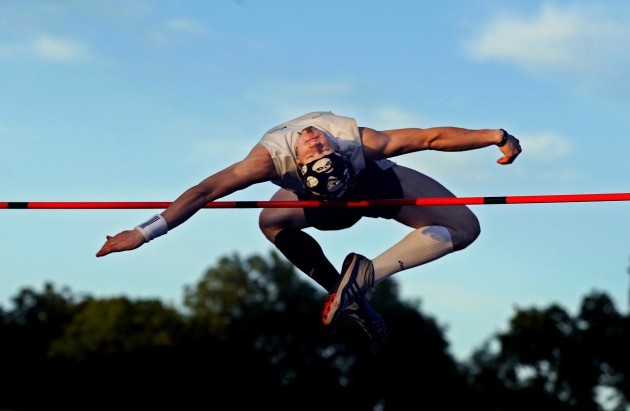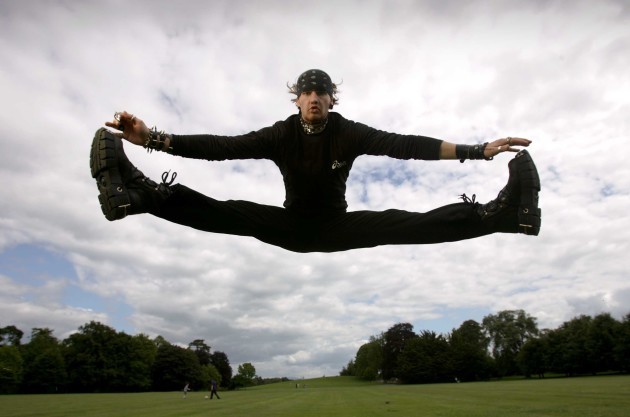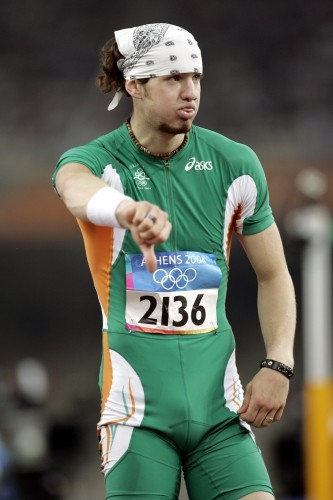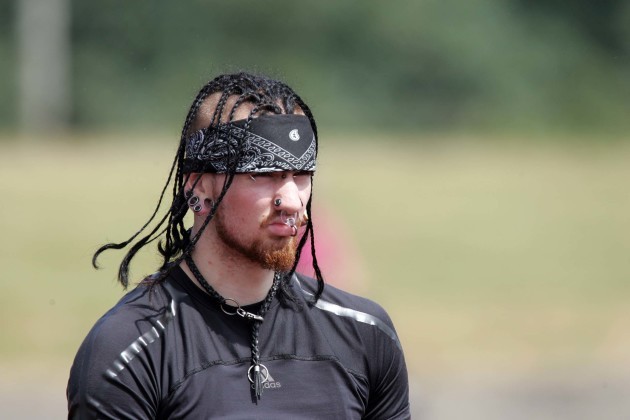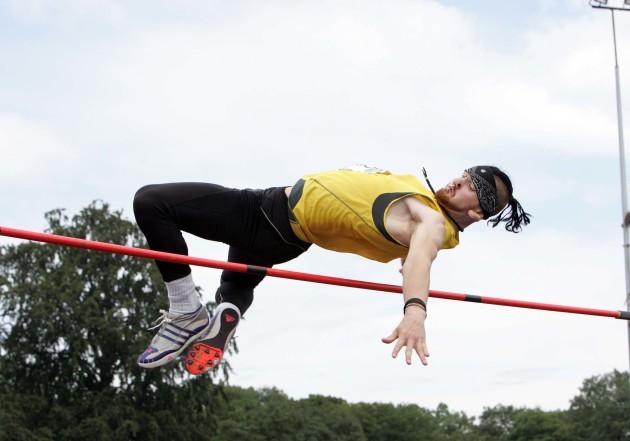HE DOESN’T MISS the mood swings, or the headaches, or that emptiness in his stomach that tells him he is starving and his body is literally feasting on itself.
He definitely doesn’t regret forking out tens of thousands of his own euros to pay for the surgeries and various treatments to correct his battered body.
And he sure as hell doesn’t look back on having a body fat of 1% as a particularly wonderful period in his life.
The life of an elite athlete, eh? Glamorous as hell.
Well in actual fact there were moments in Adrian O’Dwyer’s life where he felt high jump was the thing, what he was made to do, and all he wanted to do.
“I was training twice or three times a day, not eating after seven o’clock and there were times when I couldn’t look at something without wanting to jump over it.
High jump was all that mattered to me. I’d eat it and sleep it and breathe it. I’d see a bin and want to jump over it, a person, a fence, a car, an animal… anything! It was nuts! I loved it!
He was damn good at it too and his Irish outdoor record of 2.30m from 2004 in Algeria still stands. Few have come remotely close to bettering it.
That night in North Africa 11 years ago is one O’Dywer recalls in glorious and vivid detail.
Chapter One: Algiers
Under 40 degree heat before a voracious home following he became a star, and it was then that those outside his athletics bubble began to take note of his talent.
“It was a great, great weekend,” he recalled.
“It was an Olympic year and I was going to all these places to try and secure qualification for Athens (2004). I was training harder than I’d ever been and everything was perfect.
“So I went from a competition in Iceland where I jumped 2.20m and I got second.
“But I wanted some warm weather competition. I was sick of cold northern Europe and wanted to test myself in some warm places, thinking that Athens would be warm and the experience would be good, while also looking to secure qualification for the Olympics, obviously.
“I flew to London after Iceland and stayed there for a day where I just slept and drank water because I knew it’d be hot where I was going and couldn’t risk being dehydrated.”
O’Dwyer travelled alone, bunked with a Kenyan middle-distance runner he forgets the name of and on the night of his own event, the Kilkenny man made his own way to the stadium.
The biggest star at the meet was home favourite and bronze medallist from Sydney four years earlier, Abderrahmane Hammad. He was a high-jumper and most of the people in the stadium came only to see him win.
But O’Dwyer had other ideas.
“It was a magical night,” said the 6’ 6” former St Kieran’s College man.
“I went from -2 in Iceland to 40 degrees in the space of 36 hours but I was feeling really good.
“I jumped 2.20m in the warm-up and then on my second attempt I got 2.30m. That was everything I needed to do to make the Athens Olympics.”
That may be so, but it didn’t stop him going, well, a little bananas. Hell, he had just broken a five-year old Irish record set by Brendan Reilly, set a new PB, and was on his way to the Olympics. His qualifying jump made the deadline by eight days.
“I just soaked it up. The place went berserk so I responded by jumping into the crowd and surfing the sea of hands. I had a reputation as being a bit of a madman at the time so that did nothing to change any opinions of me!”
When his feet touched the ground some time later he was confronted by armed security who demanded he be brought to see the Sultan.
The thoughts raced through O’Dwyer’s head. What had he done now?
He was found guilty of giving the people something to cheer about, it appeared.
So this guy with a gun came up to me and said, ‘The Sultan wants to see you’. We went upstairs and there he was, the Sultan of Brunei in this big chair all to himself.He said he was impressed with my jump and thanked me for giving the crowd something to cheer about and he presented me with $3000. I’ll never forget it.
Little did he know it then but that, unfortunately, would be as good as it got for O’Dwyer.
Chapter 2: Athens and injury
With Olympic qualification secured he trained as hard as ever, but cracks started to appear.
“I did a competition down in Cork after Algiers and my ankle didn’t feel good.
“I was taking anti-inflammatories and strapping the ankle but it didn’t get better.
“I could barely jump two metres and here I was going to the Olympics.
“In the end, it was a toss-up whether I’d even go but because I chased it all my life, thought about it every second of the day, but I knew I was way off my best.”
He didn’t even attend the opening ceremony in Greece because he wanted to rest before his event.
Alas, O’Dwyer failed to clear 2.10m, the minimum height.
He came home and the dream of making the biggest – and only — event in his world had been a nightmare.
“It was a major disappointment because I was fourth in the world at the time, so to go over injured was a nightmare.
“I was nearly pulling out but we were hoping the inflammation would go down with medication, but it didn’t.
“The pain was always there and when you’re putting so much force into your lower body as I was, you can’t do it to full capacity unless you’re 100%.”
What was most gutting was not the fact he was a staggering 20 centimetres off his best in Athens – but that he had the talent to jump much, much higher than he did.
In fact, his hip height had been measured at a maximum of 2.37m from the World Indoor Championships in Hungary.
2.36m won gold in Athens.
Chapter 3: After Athens
“At the time I was gutted, but I vowed to come back.”
He lived at home with his parents, Gudrun from Dresden in Germany and local man Paddy. She had been a three-day eventer who represented her country at several Olympiad while he was an international level judoist.
That Adrian failed to jump 2.10m after setting his sights on a medal was hard enough to take after Athens but the criticism levelled at the then 20-year-old from all quarters was something he struggled to cope with;
“Since the Olympics all the journalists were at him,” said Gudrun.
“I mean he wasn’t complaining about the write-ups he got but he rang me from Athens and said ,’Mum, they’re all slagging me now.’
Little wonder he was slow to give phone interviews.
“But there was no doubt about it, his coach kept telling him he had the power and everything else to jump and we know he could have done 2.35m,” added Gudrun.
The O’Dwyers had a homemade arena built for Adrian to facilitate his passion, which remained undiminished.
Paddy built the runway with some concrete and his bare hands because all monies he got had to be spent wisely.
“That was all he had and that is what he lived for,” said Gudrun.
“Imagine, he was 21 at the time, trained by himself three times a day, got no money whatsoever, no nothing, not a penny from anyone.
We paid every single cent for his training, the physio twice a week, the doctors, it all came from us. That is not how a world-class athlete should be treated.
Gudrun laughs when she recalled him witnessing “the commotion” when the Kilkenny hurlers came home as All-Ireland champions every year.
“Mum,” he’d quiz, “I win All-Irelands every year and no one says a word about it.”
Chapter Four: Injury
O’Dwyer went over on his ankle more times than he cares to remember. He even recalls contesting an event with a fractured ankle.
When his opponents in Ireland were grappling at 1.30m, O’Dwyer would fix his gaze almost seven feet into the air and inevitably clear the bar.
But the load he placed on his body was significant. The 700-kilo calf raises, the half-ton squat rack. Day after day after day.
To correct his ankle and Achilles which bore the brunt of the punishment he flew to Germany for surgery.
“I made a bit of money from jumping but it all of went on the surgery,” he explained.
“I got them (ankles) done in Germany and the entire bill was €32,000.
“I got the surgery in Germany and it was frowned upon. It wasn’t that I didn’t trust the healthcare system here but these surgeons over there were elites in their fields. The best money could buy.
David Beckham was treated there and I said I’d rather get it done 100% so I went over on a Thursday, saw the surgeon the Friday, had the surgery on Saturday and I walked back in the door at home Monday.
Though he was the first ever Irish athlete to be ranked number one in a field event indoors, his career was over by his mid 20s.
Chapter Five: Retirement
“Now I can do what I want,” he chirped.
“I was training twice a day, not eating after seven o’clock, I had mood swings, headaches, man I couldn’t walk past something high without wanting to jump over it.
“So it was great not to worry about my Achilles and my ankle weren’t dictating my life and my livelihood. It was big load off my life to have retired.
“You see, athletics is very elitist. You can make money and tour the world but that doesn’t last and when it’s over, it’s over.
“The retiring through injury was a blessing because I was chasing it for years, trying to get right again and it made the decision easier.
“It freed me. There’s only so much of being sore a man can take and here I was getting injured, coming back, and getting injured again.
“I wasn’t able to give myself the two years off I probably needed, so I moved on.
“If I was to go back again I wouldn’t actually do high jump. I’d probably be more suited to javelin. With high jump, I was good but a lot of it was down to brute force and ignorance.
I remember being in school and all the lads would be playing hurling but I never had any interest. I could throw the ball a lot further than I could hit it!
At his fittest, O’Dwyer was around 77kg with a body fat % of 1. He acknowledges how sick he looked and often felt.
“It was dangerous what state I got myself into.
“But if you’re competing at that level it is dangerous. It’s not normal to jump high, it’s not normal to run 100 metres in 9.5 seconds so to do extreme things you need to train at an extreme level.
“Man I had headaches, I was anorexic for years…it wasn’t normal. So when I retired I decided to do the opposite and instead of leaning up I put on weight.
“I was naturally heavy with a big build so I decided to bulk up and that’s where I’m at now. I’m around 125 kilos, 19 stone, with around 7% body fat.
“That’s a nice easy weight to control and I feel a lot better than I ever did when I was competing.”
Nowadays, O’Dwyer runs Leviathan Training in Kilkenny, a fitness centre that caters for people of any background or sport.
Working in conjunction with Top Pro boxing equipment, it’s an all-purpose gym… just no bars set seven feet into the sky.
